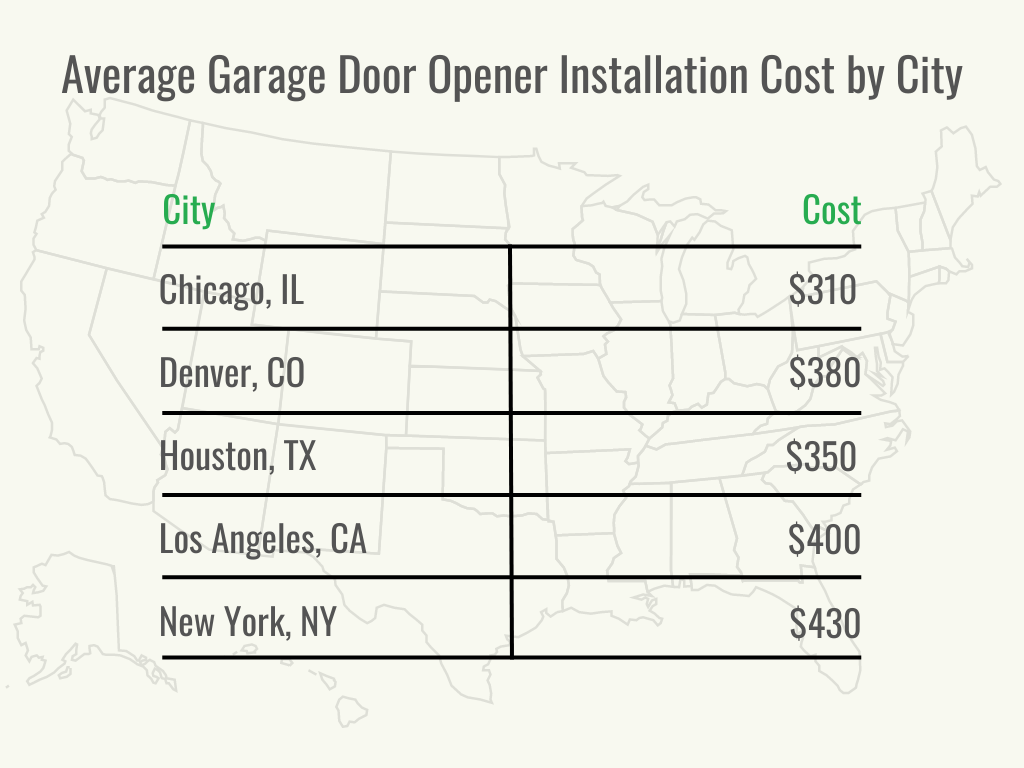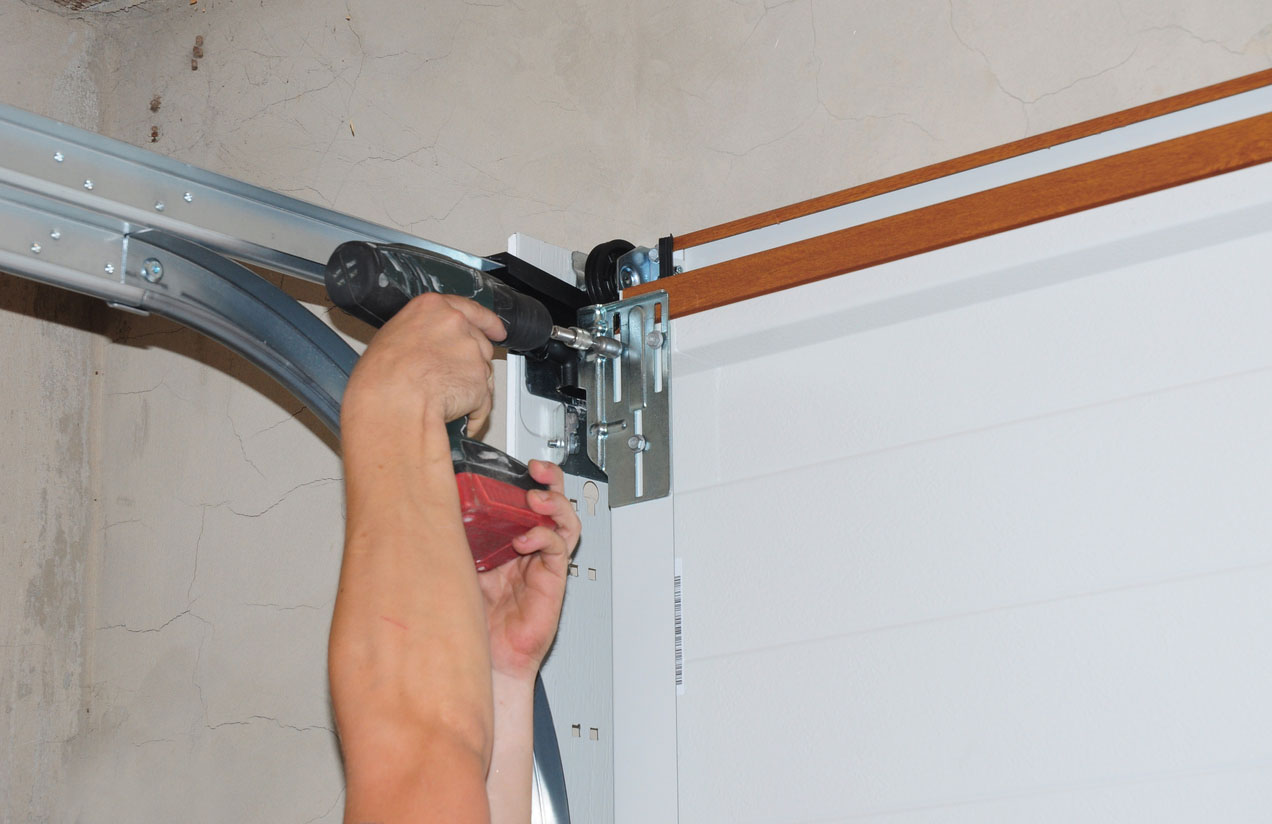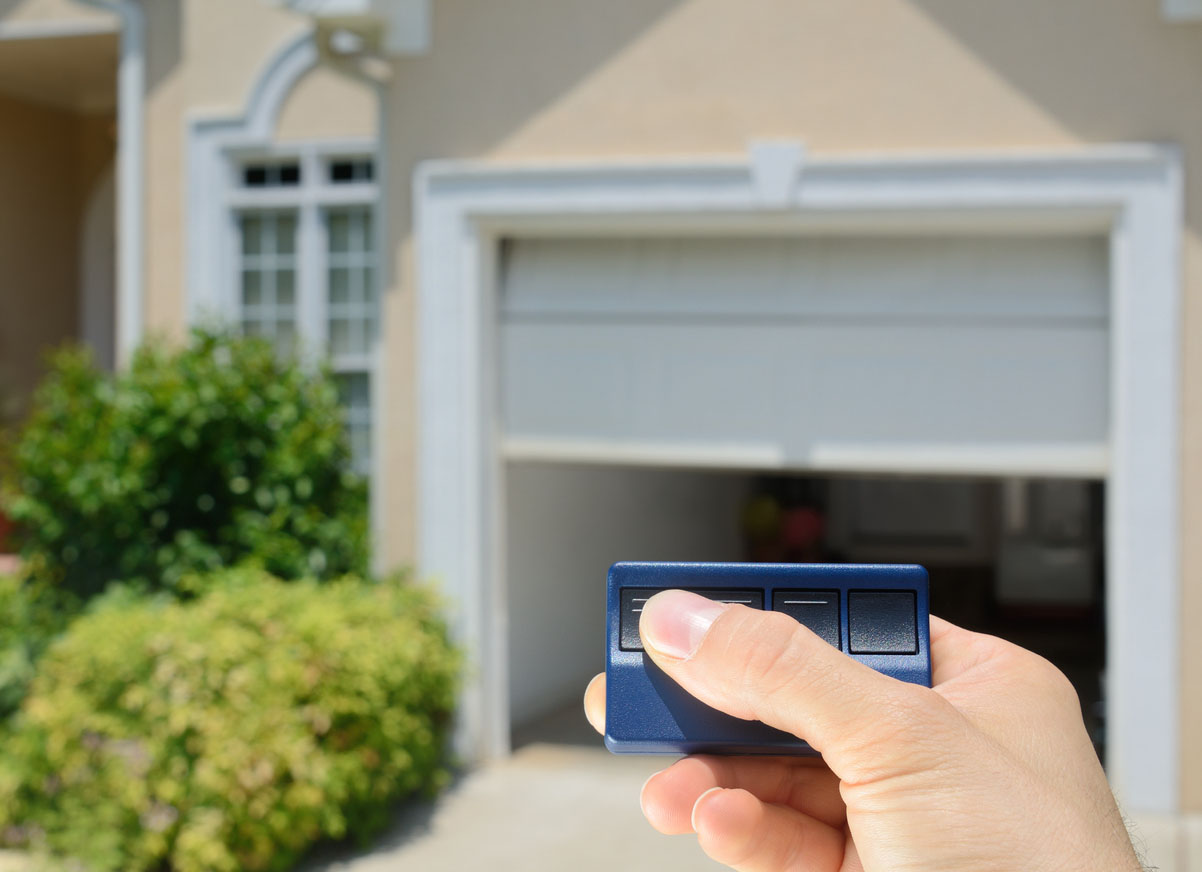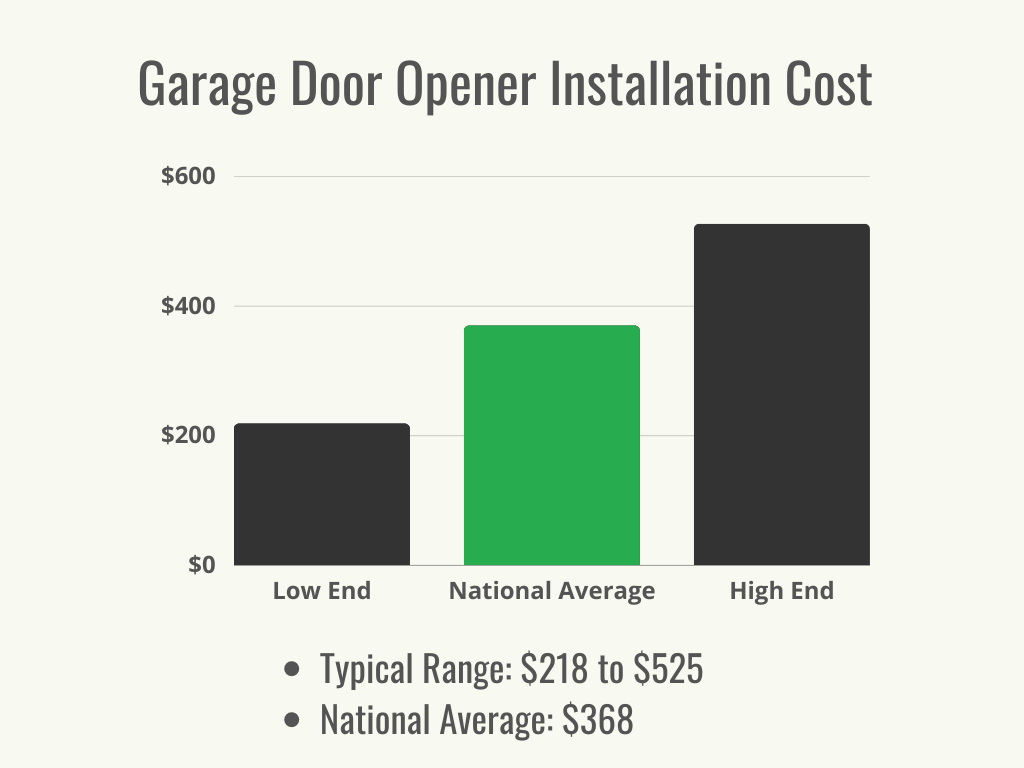We may earn revenue from the products available on this page and participate in affiliate programs. Learn More ›
Highlights
- The typical garage door opener installation cost ranges from $218 to $525, with a national average of $368.
- The main cost factors for this project are the type of garage door opener, its horsepower rating, brand, remotes and keypads, labor, and geographic location.
- There are many benefits to installing a garage door opener, including convenience, safety, security, and peace of mind.
- Installing a garage door opener is a job for a professional. Installers have knowledge of the complex electrical and mechanical workings of a garage door and can complete the project safely and without damage to the garage door.
With the push of a remote control button, a homeowner can open and close their garage door from the comfort of their car. While garage door openers are convenient, they also offer security, safety, and peace of mind. If a homeowner is building a new garage, is interested in a garage door opener for the first time, or is upgrading to an opener that a smartphone app can control, HomeAdvisor and Angi say that the cost to install a garage door opener ranges from $218 to $525, with the national average at $368. The cost for parts can run between $150 and $520, and labor is typically between $65 and $85 per hour. In addition, extra parts or equipment rentals can cost between $50 and $75. If the new garage door opener is replacing an old one, the professional will usually include the cost of removal in their price quote. The total cost of installing a garage door opener depends on the brand, type, horsepower rating, and system model.
Factors in Calculating Garage Door Opener Installation Cost
Several factors affect garage door opener installation costs. Prices can differ from the national average due to labor costs in a particular area; the garage door opener’s type, brand, model, and horsepower rating; and the potential need for extra parts.
Type
There are many types of garage door openers, including belt, chain, screw, jackshaft, and direct-drive models, each with its own benefits. A noisier, less expensive chain-driven garage door opener may work for a detached garage. If the garage is attached to the house, a quieter option like a direct-drive may be preferable. Types of garage door openers will be covered in more detail below.
Horsepower Rating
“Horsepower” refers to the lifting capacity of the motor in the opener. The heavier and larger the garage door, the more horsepower it will need to open and close it. Most garage doors can be opened with a ⅓ or ¾ horsepower motor, but more powerful motors are likely to last longer. For garage doors that are heavier or larger than average, a 1 horsepower motor may be needed.
Brand
Several manufacturers make good-quality garage door openers. Each brand has its pros and cons, and not every manufacturer makes all types of garage door openers. Craftsman garage door openers cost $125 to $275, whereas LiftMaster and Hormann have options that reach up to $500. Deciding on the type of opener that is needed will help homeowners determine which brand offers all the desired features while fitting the budget. The best garage door opener models usually have more horsepower and provide additional features. The table below shows the average costs for common garage door opener brands.
| Garage Door Opener Brand | Cost (Materials Only) |
| Chamberlain | $150 to $300 |
| Craftsman | $125 to $275 |
| Genie | $150 to $400 |
| Guardian | $175 to $350 |
| Hormann | $200 to $500 |
| LiftMaster | $300 to $500 |
| Linear | $250 to $400 |
| Sommer | $200 to $300 |
Remotes and Keypads
It costs between $30 and $60 to replace a garage door keypad, and new remotes can run between $15 and $40 each. The remote control connects to receivers that are built into the opener’s circuit board. Some homeowners decide to upgrade their remote with Wi-Fi-connected apps via their smartphones.
Labor
Garage door opener installers charge $65 and $85 per hour for labor. Some of the best garage door installation companies offer this service, or homeowners may need to find a different professional, such as an electrician or a general handyman. It can take between 2 and 6 hours to install. If the garage door is taller than 7 feet, an extension kit will probably be necessary, which can cost an additional $50. Homeowners will want to check with the installer to see if they anticipate needing any additional parts.
Geographic Location
Labor costs to install a garage door opener can vary depending on location. For example, costs in New York City may be as high as $430, whereas the same project might cost $310 in Chicago. Homeowners located in dense urban areas generally pay higher prices, so costs will likely be lower in smaller cities and rural areas.

Additional Costs and Considerations
When homeowners are budgeting for garage door opener installation costs, there will be additional price factors and considerations. These can include additional fees for removal of the existing garage door opener; installation of remotes and keypads, garage door sensors, lighting, electrical wiring, or battery backup; and maintenance.
New vs. Replacement Garage Door Opener
Some garage door professionals include the removal of the old door opener as part of their installation service, often with a total of $525 for the whole job. Others will charge an additional fee to remove it. However, if any of the old parts can be salvaged or reused, the cost to replace the garage door opener could be as low as $225 to $300. Homeowners will want to ask the garage door professional if removal is included with the installation fee. In the event that a homeowner is replacing the garage door simultaneously, a contractor may include the door opener removal fees as part of the garage door replacement cost; for budgeting purposes, it’s always wise to ask. Likewise, if the homeowner is building a new garage, the contractor will likely include garage door opener installation in the total cost to build a garage.
Sensors
An essential part of garage door safety features is the sensor, which will cost between $50 and $100. Since 1993, there’s been a federal law that garage doors need a safety sensor. There are two types of sensors, and some garage door opener models come with both installed.
- Laser. A laser sensor will project a laser across the path of the garage door. If an object obstructs the laser, the garage door will stop immediately.
- Automatic reverse. An automatic reverse sensor will stop the garage door if it touches an object and will immediately reverse its motion.
Lighting
Most garage door opener systems come with lighting. If not, it can cost between $50 and $150 to have lighting installed. The lights will activate when the garage door is opened and typically stay on for about 30 seconds or more. If the bulbs need to be replaced, homeowners are advised to replace incandescent bulbs with LED bulbs, which cost $10 each.
Automatic Locking
For an additional security measure, homeowners can have automatic locking installed on their garage door so that they don’t have to remember to lock it after leaving. Adding this feature to a garage door costs about $85, but it is also already included in some automatic garage door openers.
Connectivity
Choosing a garage door opener with connectivity means that it can be accessed remotely via smartphone. Homeowners can use this feature to control their garage door either using an app or Bluetooth. They can also opt to receive notifications whenever the garage door is opened and they are not home. This feature costs $150 to $400.
Electrical Wiring
If the garage isn’t wired for electricity, an electrician will need to run the wiring at a cost of an additional $50 to $130 per hour.
Battery Backup
Garage door openers will not work if the power goes out at home, but a $100 battery backup will fix that problem. Some brands of garage door openers will come with a battery backup for a slightly increased price.
Extension Kit
Garage doors that are taller than 7 feet sometimes require an extension kit in order to install a garage door opener. These kits cost about $50 on average.
Maintenance and Repairs
Different types of garage door openers need more maintenance than others. Chain-drive openers usually require more maintenance than the other models. Garage door openers can last around 10 to 15 years on average, and they’ll last longer when they are properly maintained. Some homeowners are comfortable performing regular maintenance on garage door openers; others don’t mind paying a professional the cost of garage door spring replacement, tightening loose hardware, lubricating a chain, or greasing rails. Homeowners can expect garage door repair costs, including door opener repairs, to total about $65 to $85 per hour.

Types of Garage Door Openers
When choosing between different types of garage door openers, homeowners will want to weigh the pros and cons of each to decide which best fits their needs and budget. Options include belt-drive, chain-drive, direct-drive, jackshaft-drive, and screw-drive models.
| Garage Door Opener Type | Cost (Materials Only) |
| Belt-drive | $160 to $450 |
| Chain-drive | $150 to $250 |
| Direct-drive | $280 to $500 |
| Jackshaft-drive | $250 to $515 |
| Screw-drive | $200 to $500 |
Belt-Drive
Belt-drive garage door openers can run from $160 to $450. This type uses a steel-reinforced rubber belt to open and close the door instead of a chain. It’s a popular option, since it is much quieter than a chain-driven opener. This type of opener needs less regular maintenance, and it can be hooked up to the home’s internet connection with Wi-Fi or Bluetooth capabilities. A belt-drive opener may wear out faster than a chain-drive opener, and high temperatures or excessive humidity can cause the belt to slip.
Chain-Drive
Chain-drive garage door openers can cost between $150 and $250. They have a basic design where a metal chain pushes or pulls the garage door along tracks to open or close it. Since a chain-drive garage door opener has more moving parts than other options, it typically requires more maintenance. This is the noisiest type of garage door opener, and some homeowners choose this budget-friendly option if they have a detached garage and don’t mind how loud it is when it operates. Chain-drive openers are durable, strong, and reliable. Some heavy garage doors may require this type of opener to handle the extra weight. Chain-drive openers rarely have a battery backup, and they need to be lubricated regularly.
Direct-Drive
Direct-drive garage door openers cost between $280 and $500. The design is simple: The motor opens and closes the garage door without a chain, belt, or screw. It’s quiet, strong, has minimal moving parts, and has both sensor safety and automatic reverse systems. This is the best option for those who want a nearly silent operation, but it’s the most expensive of all the types of openers.
Jackshaft-Drive
Jackshaft-drive door openers are spring-operated and are mounted on the wall next to the garage door. Next to direct-drive openers, jackshaft-drive openers are one of the quietest options on the market. This type of opener costs $250 to $515.
Screw-Drive
Screw-driven openers are not as popular as they once were. Previously, they were the garage door opener of choice for those looking for a quiet option, but belt-driven models became more popular. Screw-drive openers use a threaded metal screw rod that rotates to open and close the garage door. Since it doesn’t have many moving parts, it requires minimal maintenance of twice-a-year lubrication. This type of garage door opener doesn’t do well with significant temperature fluctuations or heavy one-piece garage doors and can cost between $200 and $500.
Benefits of Garage Door Opener Installation
A garage door opener is one of life’s little luxuries. Along with being convenient, an automatic opener adds to the safety and security of a home. The benefits of a garage door opener are explained in more detail below.
Convenience
Like the cost to insulate a garage, the cost to put in a garage door opener can be worth it for homeowners wanting to make the garage a safer, more comfortable place. The major benefit of a garage door opener is the convenience. By having an opener, homeowners can open and close the garage door from the comfort of their car. It won’t be necessary for them to get out and manually open or close the door while being exposed to extreme temperatures, rain, snow, or wind.
Safety
Modern garage door openers come with safety sensors and automatic reverse systems. If the door senses a vehicle, person, or object in the path of the door, it will stop immediately. This will avoid damage to vehicles and protect anyone in the household who may be using the garage door.
Security and Peace of Mind
Another available option in modern garage door openers is something called a rolling code, which will change the code each time the remote button is pressed. This prevents the duplication of the remote code so no one can break into the garage or, by extension, the home. Vacation mode is another option that prevents people from opening the garage door from the outside. This mode disables the garage door opener remote, and the door can be opened only from the inside. This prevents intruders from opening the door with a garage door remote scanner. These additional features can provide peace of mind so homeowners can rest easy knowing that their family, garage, home, and belongings are safe.

Garage Door Opener Installation: DIY vs. Hiring a Professional
Garage door opener installation can be a DIY project only for homeowners who have the electrical, mechanical, and carpentry knowledge and skill level to install a garage door opener; however, it’s not a task to take lightly. The high-tension springs used in garage door openers can cause severe injury and even death if not installed properly. The garage door will need to be balanced and adjusted to the tracks of the opener, and lining up the rail tracks can present some issues for those who are inexperienced. Homeowners will also want to be aware that some garage door opener warranties are not valid with a DIY installation. This is why many homeowners prefer to have a garage door professional install an automatic opener. It would take DIYer hours to learn how to install a garage door opener, acquire the necessary tools, and actually complete the installation. By contrast, a professional installation can take a little over an hour.
How to Save Money on Garage Door Opener Installation Cost
Garage door opener installation costs can get pricey, and the additional costs associated with the project can quickly add up. One way to save on garage door opener installation costs is to buy the cheapest option, but there are other ways to save without compromising on quality.
- Get multiple quotes. Get at least three estimates from reputable garage door companies in your area, and choose the one that works the best for you and your budget.
- Check the horsepower. You don’t need a more expensive opener with the most horsepower if you have a lighter garage door. Ask your garage door professional how much horsepower you need for your garage door.
- Check with the local home improvement stores. Home improvement stores like The Home Depot in your area may install the garage door opener for less than $200 if you buy the garage door from them.
- Go for the chain-drive. If you don’t mind the extra noise and lack of additional features of a chain-drive garage door opener, you can save money by going with this model.
- Let the contractor buy the opener. Sometimes garage door contractors can get openers at discounted rates and pass on the savings to you.
- Ask for package discounts. Some garage door companies may offer a discount on opener installation if you choose a new garage door and purchase it from them.
- Check your homeowners insurance. Some homeowners insurance policies cover garages. If the opener is being replaced because of damage from a storm or other covered peril, some of the costs may be covered.

Questions to Ask About Garage Door Opener Installation
Asking a professional the right questions about garage door opener installation costs can help homeowners minimize miscommunication, save money, and get the desired results. Below are some questions to ask a garage door opener professional.
- Are your employees licensed and insured?
- How long have the technicians been installing garage door openers?
- How long will it take to install the garage door opener?
- Do you offer a warranty?
- How much do you charge for labor?
- Do I need to be there during the installation?
- What brands and models do you offer?
- Does the opener come with a battery backup?
- What do you charge for repairs if I have a problem with the garage door opener?
FAQs
Deciding on a garage door opener while staying within a budget can be a daunting process. The following are some frequently asked questions about garage door opener installation cost to help guide this decision.
Q. Can I install a garage door opener on my own?
You can if you have the experience, knowledge, and time to tackle the project. Many homeowners prefer to hire a garage door professional to install an opener for the peace of mind it offers. The high-tension springs are dangerous if not installed correctly.
Q. How long will my garage door opener last?
Garage door openers typically last between 10 and 15 years. If the opener struggles to open and close the door because of a lack of horsepower, it may not last as long. A well-maintained garage door opener will last longer.
Q. What is the best type of garage door opener?
The best type of garage door opener is the one that works the best for you and the size of the door. Certain types of openers work better with heavier and larger doors. Some homeowners prefer a quieter direct-driven or belt-driven model, while others aren’t bothered by the extra noise of a chain-driven model.
Q. How much horsepower do I need for my garage door opener?
For single garage doors or ones on the lighter side, a ½-horsepower opener should work just fine. Double doors that are more than 14 feet long need a ¾- to 1¼-horsepower opener. A garage door professional will be able to steer you in the right direction with how much horsepower your garage door needs.
Q. When should I replace a garage door opener?
A few red flags that signal it’s time to replace a garage door opener are that the opener works intermittently, it stops working altogether, the door is moving slower than usual, the door detaches from the opener, it starts to make loud or unusual noises, it starts to open and close randomly, or the opener starts to vibrate. If you’ve had a garage door opener for more than 10 or 15 years, it’s good to consider a replacement. Newer openers are safer and quieter.
Q. How long does it take to install a garage door opener?
A DIY installation can take between 4 and 6 hours, while a professional installation can take just over an hour.
Sources: HomeAdvisor, Angi, Fixr, Thumbtack, HomeGuide


